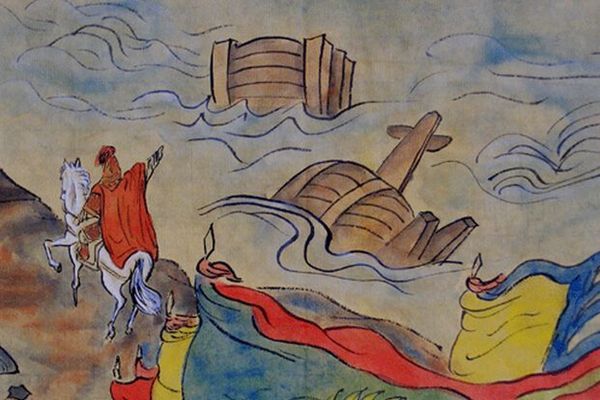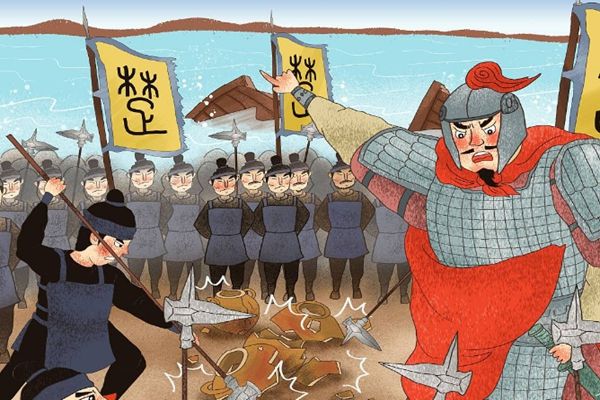
The Chinese idiom “break the caldron and sink the boat” originated from the “Annals of Xiang Yu” in the Historical Records, by Sima Qian. Its literal meaning is to break the caldrons and sink the boats, used to metaphorically describe not leaving any way out, being decisive in doing things, and being determined to do everything to the end.
The origin of this idiom comes from the war between Xiang Yu and the Qin army. In order to motivate the soldiers to engage in a decisive battle, Xiang Yu ordered to burn the bridges, break the caldrons and sink the boats after crossing the river, bringing only three days' worth of rations, in order to show the soldiers that he would fight to the death and have no way out. This resolute attitude and action symbolize the spirit of fearlessness and courage to move forward in the face of difficulties and challenges.
Therefore, the idiom “break the caldrons and sink the boats” is often used to describe a person's firm determination and decisive actions when facing major choices or difficulties.
The act of breaking the caldrons and sinking the boats is very similar to forcing somebody to join rebels, but the former is proactive while the latter is passive. The act of of breaking the caldrons and sinking the boats shows a posture of victory in a narrow encounter, but this posture should be based on a comprehensive measurement and grasp of one's own strength, otherwise it is an overestimation of one's own ability and recklessness like a moth flying towards the flame. In situations where there is a significant disparity in strength between the two sides, that is, when the chances of winning are not high, one should choose to avoid their rival’s strengths, wait for the opportunity, and find their weaknesses to take action. This is almost equivalent to the guerrilla tactic of "fight if you win, run if you can't win", and we cannot charge forward at all costs. There can only be two outcomes: victory or death. Victory is certainly gratifying, but once it fails, there is nothing left and no possibility of a comeback. This can also explain why Xiang Yu later committed suicide by the Wujiang River. He had the opportunity to escape and lead 800 young men from Jiangdong to make a comeback, but Xiang Yu ultimately took a desperate stance, leaving behind a good reputation and regrets for future generations.
Keep a green mountain, and there is plenty of wood. Knowing how to endure hardships and humiliation, enduring hardships to accomplish some ambition, only then can we achieve ultimate victory. Whoever laughs until the end is the ultimate winner. From this, it can be seen that unless it’s absolutely necessary, one should not sacrifice one's life.
破釜沉舟是一个汉语成语,最早出自《史记•项羽本纪》。其字面意思是把饭锅打破,把渡船凿沉,用以比喻不留退路,做事果决,下定决心不顾一切地干到底。
这个成语的典故来源于项羽与秦兵的战争。项羽为了激励士兵决战,过河后下令破釜沉舟,只带三天的口粮,以此向士兵表示决一死战,毫无退路。这种决绝的态度和行动,象征着面对困难和挑战时的无所畏惧、勇往直前的精神。
因此,破釜沉舟常用来形容人在面临重大抉择或困境时,表现出的坚定决心和果敢行动。
破釜沉舟与逼上梁山很是相似,但前者是主动的,后者是被动的。破釜沉舟表现出来的是一种狭路相逢勇者胜的姿态,但这种姿态应是基于自己实力的全面衡量和把握,否则就是自不量力,飞蛾扑火。在双方力量悬殊较大的情况下,也就是取胜把握不大的情况下,应选择避其锋芒,等待时机,寻找其薄弱之处下手。这几乎等同于“打得赢就打,打不赢就跑”的游击战术,而不能不顾一切往前冲,只能有两种结果:战胜或者战死。战胜固然可喜,但一旦失败就什么也没有了,没有了东山再起的可能。这也能够解释,为何项羽后来自刎于乌江边。他原本有机会逃脱,带领800江东子弟卷土重来,不是没有这种可能,可项羽最终还是采取了破釜沉舟的姿态,在留下美名的同时,也给后人留下了遗憾。
留得青山在不怕没柴烧,懂得隐忍,懂得忍辱负重,卧薪尝胆,才会取得最终的胜利。看谁笑到最后,才是最后的赢家。由此可见,不到万不得已,不可破釜沉舟。

Congratulations, your post has been upvoted by @dsc-r2cornell, which is the curating account for @R2cornell's Discord Community.
Enhorabuena, su "post" ha sido "up-voted" por @dsc-r2cornell, que es la "cuenta curating" de la Comunidad de la Discordia de @R2cornell.
Many thanks to you.